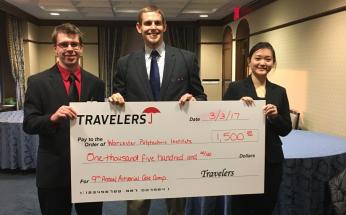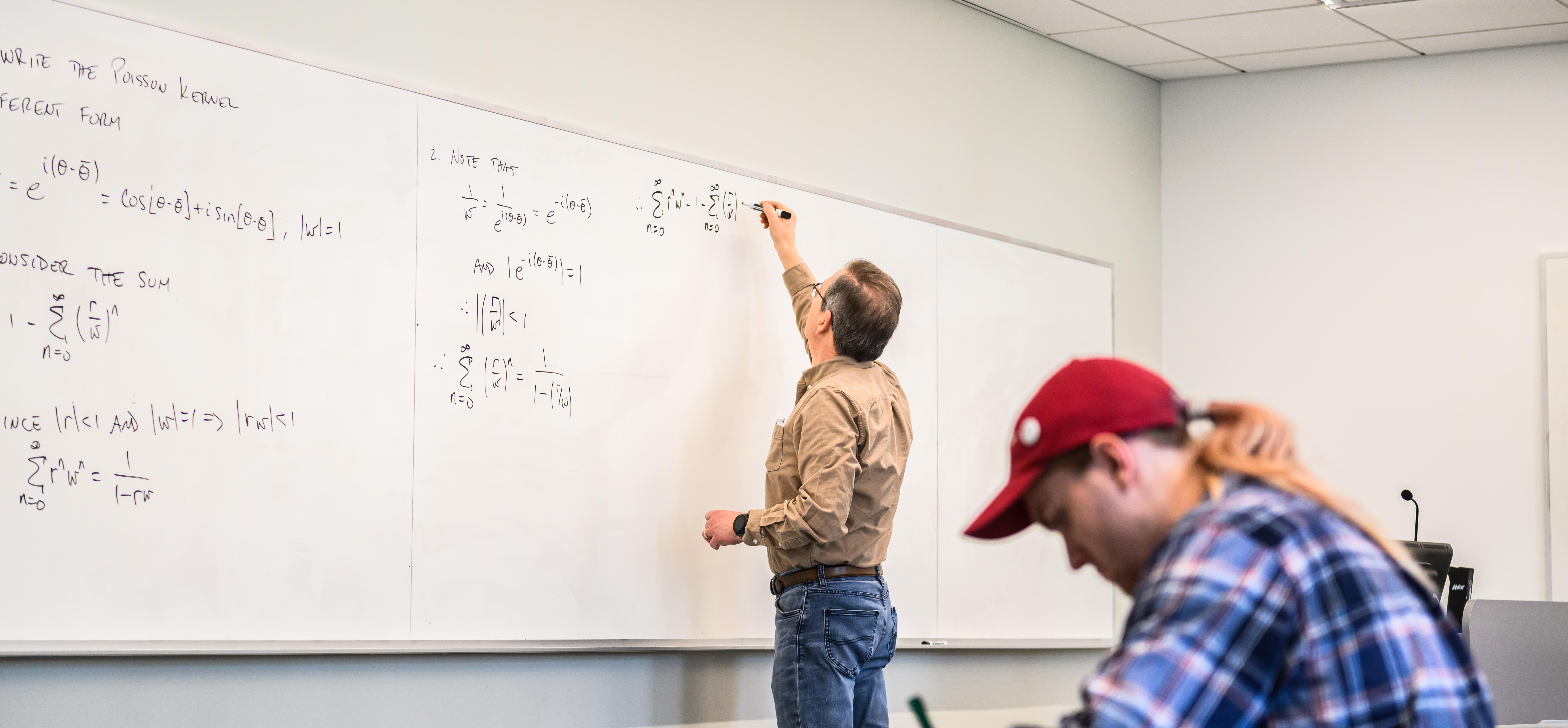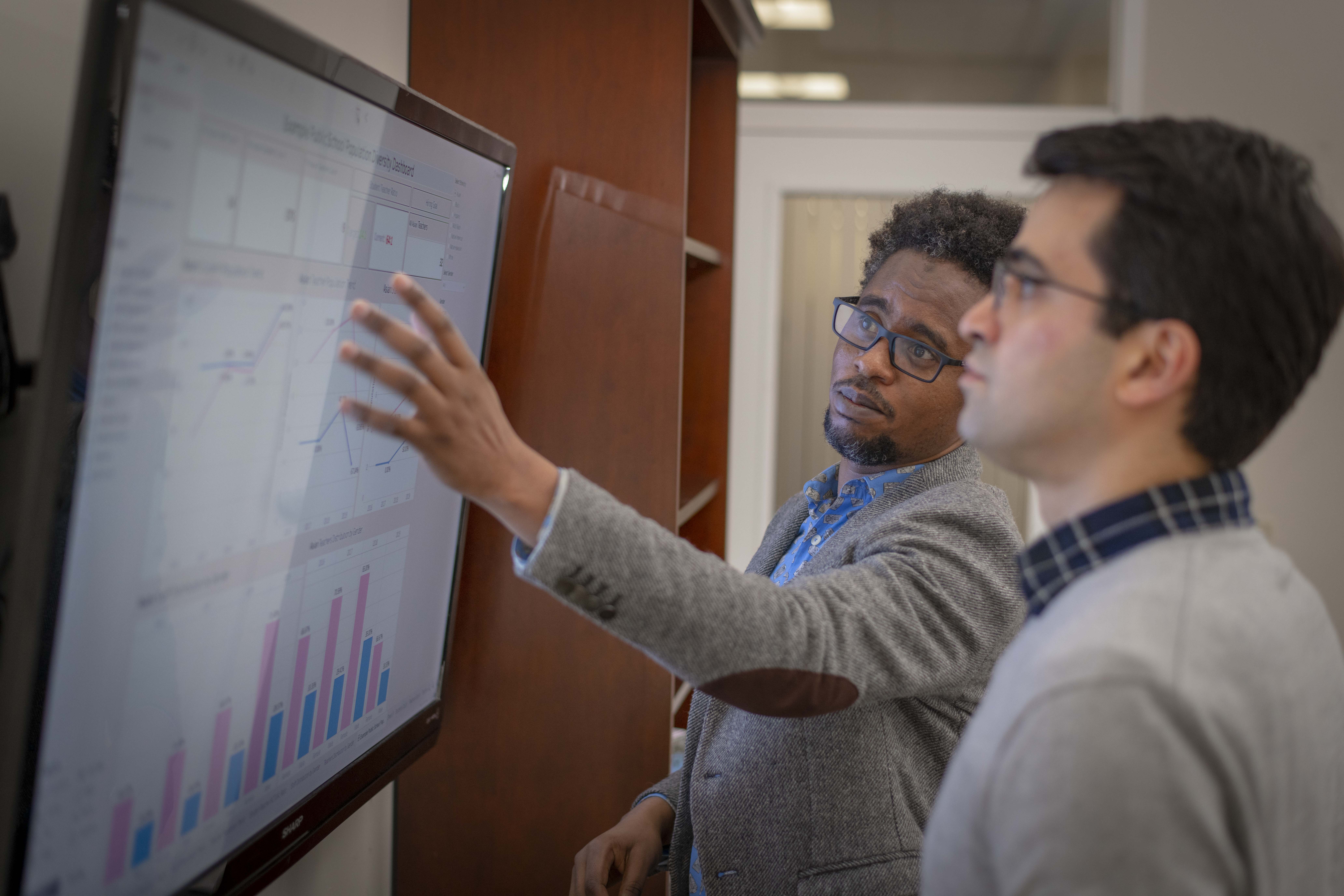John McGinn ’18, Rob Wondolowski ’20, and Emily Chen ’20 enjoy using statistics to deal with risky business.
Through five hours of number crunching, data analysis, and problem solving earlier this month, they successfully designed strategies for auto, home, and liability insurance policies—evaluating risk against returns as student actuaries in the annual Travelers Case Competition in Hartford.
Their work and the 15-minute presentation they made took first place in the competition—the second time in four years a WPI team has won.

Jon Abraham
“I knew they could do the work,” says Jon Abraham, professor of practice in mathematical sciences and coordinator of the program in actuarial mathematics. “But the impressive part was the way they got up there and gave such a nice, clear, well-organized presentation —and then the way they responded in the Q&A session. Their answers were right to the point. They thought on their feet.”
The WPI team outdistanced teams from UConn, Temple, Bryant, and Bentley.
“The outcome was very cool,” says McGinn, a junior from Pomfret, Conn.
Actuaries use statistics, probability, and other math tools to analyze data and establish risk—mostly for insurance companies. They play a role in designing insurance products, determining what a company should charge in a competitive market place, and deciding how the money from customers should be invested.
At WPI actuarial math majors take a wide array of math—statistics, probability, financial mathematics, and specialized actuarial math courses—as well as business, economics, and computer science. Like all WPI students, they work on projects throughout their time at the university and take advantage of summer internships in their field. They also prepare to take certification exams as actuaries.
“You have to know math, but you’re working in a business environment,” says Abraham, who came to WPI 13 years ago from a job as an actuary at John Hancock Insurance in Boston. “The actuarial world is where business and math meet—to be successful you have to be good at both fields.”
Abraham says the major has grown since he came to WPI. In 2004 the university graduated five actuarial math majors; this year there will be 20.
One lure of the major is the demand for actuaries and good starting pay. Abraham points out that most of the majors will find jobs with insurance companies. Some will go to graduate school.
“Students who complete four years and have good CPAs, work as interns at insurance companies in the summer, and pass a qualifying exam or two—it’s almost universal that they will find full-time jobs upon graduation,” says Abraham. He estimates that starting annual pay is in the $60,000 range.
The team members profess an abiding love of statistics.
“Stats makes you think about two things: math and communicating results,” says McGinn, who spent last summer as an actuary intern with Mass Mutual in Springfield. “Communicating your results effectively is just as important as any complicated analysis you do. That’s what piqued my interest in stats: my results are data-driven, my inference can be categorical, and I need to explain my conclusions precisely.”
Wondolowski, who decided to come to WPI for its actuarial math program after searching the Internet for the right career field and the right college, says statistics “just fascinates me, looking at how the numbers look and at the distribution—what proportion of the values fall in different categories.”
Chen says she likes statistics because it offers more than the math she learned in high school in which finding a numerical answer is the key.
“It’s kind of a way of thinking about things,” she says. It’s a lot of hypothesis testing. “It’s a lot of analyzing data and a lot of drawing conclusions. It’s more practical.”
“You have to know math, but you’re working in a business environment. The actuarial world is where business and math meet—to be successful you have to be good at both fields.” -Jon Abraham
All three are intrigued by the real-world possibilities of actuarial science.
“The big draw for me in actuarial science is it’s a data-driven profession that draws qualitative results,” says McGinn. “The big challenge to business is how you can innovate effectively. I think in large part actuaries are taking up roles in business where you might look for new results or trends you might not find otherwise.”
McGinn, who will intern this summer at Travelers Insurance, says he is particularly excited about how actuaries are employing behavioral analytics in their work, using data on consumers to design products and add value to companies. He looks forward to facing challenges, like designing insurance products for millennials and figuring out how to insure self-driving cars.
Wondolowski sees actuarial science as a pragmatic extension of his love of math.
“I loved math but I was never a fan of typical math like general math,” he explains, “and from what I could gather from actuarial websites it‘s problem solving, which is something I love to do.”
Chen says she started studying actuarial math at WPI by accident. She knew she wanted to concentrate on math—and actuarial math was before math on the majors list alphabetically, so she checked that.
“I’m very glad I did—it’s more than statistics. It’s used a lot in the real world,” says Chen, who also likes the idea that actuaries need to pass certification exams – gaining stamps of approval.
All three WPI team members say they didn’t expect to win the Travelers contest because they had a smaller team than other schools, and, with two freshmen on the team, less classroom time in actuarial matters. As a result, they savored the accomplishment even more.
It helped, too, that they got to share the contest’s $1,500 prize. As Abraham points out (doing the math), “since they were just three instead of the maximum permissible six, they end up with $500 each!”
- By Thomas Coakley





